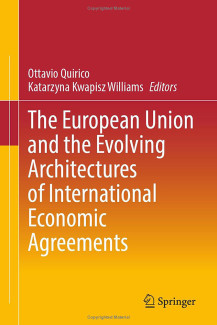
Description
The European Union (EU) is promoting a suite of innovations in international economic regulationamong them, reforms for secure and sustainable investment, a comprehensive approach to the mutual recognition of professional qualifications, a viable carbon border adjustment mechanism, heightened intellectual property rights protection, the arms length principle in taxation, and an increased commitment to non-economic vales. Through a critical analysis of key regulations and policies, this volume explores the evolving architectures of international economic agreements in light of EU practice. A comprehensive analysis indicates that novelties are rooted in geoeconomic considerations, through which a fundamental shift is underway towards the adoption of comprehensive bilateral trade agreements. Whilst innovation has the potential to significantly harmonise cross-border regulatory frameworks, it can also trigger significant fractures, particularly when applied restrictively and asymmetrically. Arguably, the Brussels effect will to a certain extent foster a progressive development of international economic regulation, while in some respects being constrained by the status quo of the international economic regime.